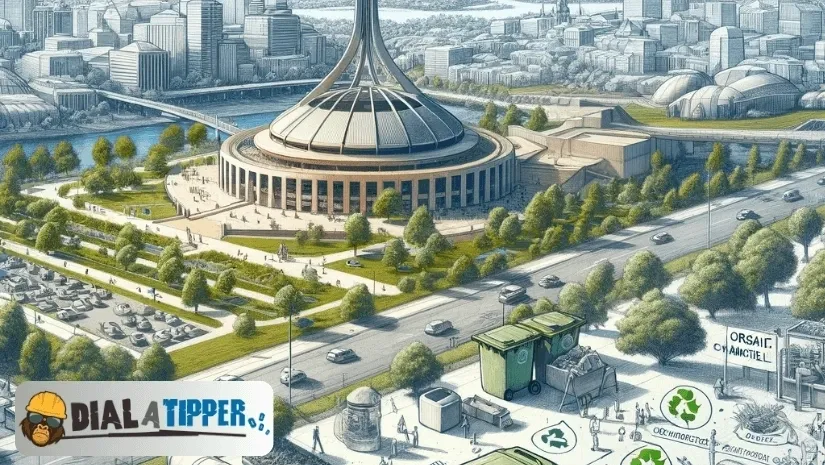In the heart of Canberra, the need for sustainable waste management practices has never been more pressing. At Dial a Tipper, we’re not just addressing this need but leading the charge. Our focus on Organic Material Recovery and recycling isn’t just about waste disposal; it’s about transforming waste into valuable resources for a healthier planet.
5 Points for Dial a Tipper Leads in Organic Waste Recycling
- Dial a Tipper Leads in Organic Waste Recycling: Emphasizes the company’s proactive role in transforming organic waste into valuable resources in Canberra.
- Composting Enriches Soil Health: Highlights turning organic waste into a nutrient-rich soil amendment, benefiting agriculture and gardening.
- Anaerobic Digestion Produces Renewable Energy: Details how to Dial a Tipper converts organic waste into biogas, contributing to Canberra’s renewable energy goals.
- Organic Recycling Reduces Greenhouse Gases: Focuses on the significant reduction of methane emissions through diverting organic waste from landfills.
- Zero Waste Initiatives Foster Sustainable Practices: Underlines Dial a Tipper’s commitment to reducing waste, promoting recycling, and using biodegradable materials for a sustainable future.
Composting: Turning Waste into Gold

Composting is a cornerstone of our organic waste recycling efforts. This process transforms organic waste into a nutrient-rich Soil Amendment, improving soil health and reducing reliance on chemical fertilizers. By encouraging the natural breakdown of organic materials, composting returns essential nutrients to the earth, promoting sustainable agriculture and gardening in our Canberra community.
Anaerobic Digestion: Energy from the Unlikely Sources
Another critical aspect of our work is Anaerobic Digestion. This advanced technology allows us to convert organic waste into Biogas, a renewable energy source. This Waste-to-Energy conversion is a game-changer, offering a sustainable alternative to fossil fuels and contributing to Canberra’s renewable energy goals.
A Greener Canberra: Reducing Emissions and Enhancing Sustainability
Organic waste recycling plays a vital role in Methane Capture. By diverting organic waste from landfills, we significantly reduce Greenhouse Gas Emissions, particularly methane, a potent greenhouse gas. This reduction is crucial in combating climate change and protecting our environment.
Zero Waste Canberra: A Vision for the Future
Our commitment to Zero Waste Initiatives reflects our dedication to a sustainable future. These initiatives focus on reducing waste at the source, promoting recycling, and encouraging the use of Biodegradable materials. By adopting these practices, we’re not only managing waste more effectively but also educating and inspiring our community to join us in these efforts.
Reducing Carbon Footprint: A Collective Responsibility
Every step we take in managing organic waste helps in Carbon Footprint Reduction. Through comprehensive Environmental Impact Assessments, we ensure that our processes contribute positively to the environment, setting a benchmark for waste management practices in Canberra.
Towards a Sustainable Future: Dial a Tipper’s Commitment
At Dial a Tipper, we don’t just handle waste; we’re passionate about creating a sustainable future for Canberra. By employing strategies for Waste Stream Analysis and reduction, we’re constantly innovating to find better, more efficient ways to manage waste. Our commitment to Landfill Diversion and Resource Recovery underscores our dedication to environmental stewardship.
Does Composting Really Make a Difference?
Yes, composting makes a significant difference. Converting organic waste into compost allows natural decomposition, turning it into a rich soil amendment. This process enhances soil quality, reduces the need for chemical fertilizers, and prevents the environmental issues caused by waste in landfills.
How Does Anaerobic Digestion Work and Why Is It Important?
Anaerobic digestion is the process where organic waste is broken down by microorganisms in an oxygen-free environment. This process produces biogas (predominantly methane and carbon dioxide), a renewable energy source. It’s important because it offers a sustainable alternative to fossil fuels and helps manage organic waste efficiently.
How Does Organic Waste Recycling Help Reduce Greenhouse Gas Emissions?
Organic waste recycling significantly reduces greenhouse gas emissions, primarily through composting and anaerobic digestion. When organic waste decomposes in landfills, it releases methane, a potent greenhouse gas. Recycling prevents this and contributes to a healthier environment.
What Are Zero Waste Initiatives, and How Can I Participate?
Zero Waste Initiatives aim to reduce waste at the source, promote recycling, and encourage using biodegradable materials. You can participate by minimizing your waste, segregating recyclables, and choosing products with less packaging or made from recycled materials.
Conclusion: Joining Hands for a Greener Tomorrow
We believe that managing organic waste is a shared responsibility. It’s not just about what we do; it’s about how we inspire others to act. Together with the Canberra community, we can make a significant impact. We invite you to join us in our journey towards a sustainable, waste-free future.
